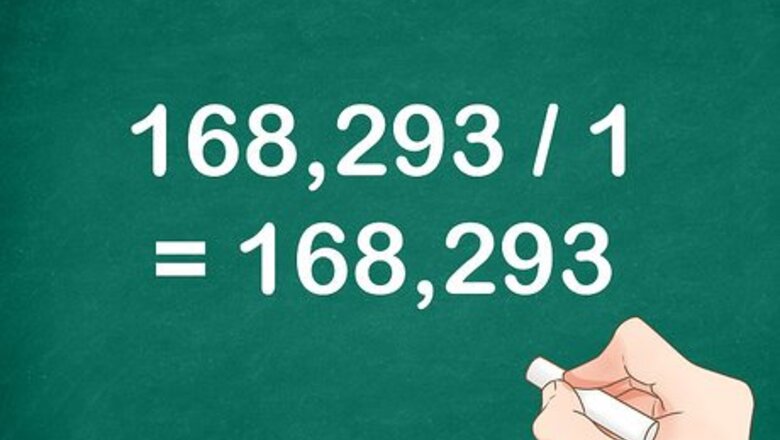
views
Testing the Numbers
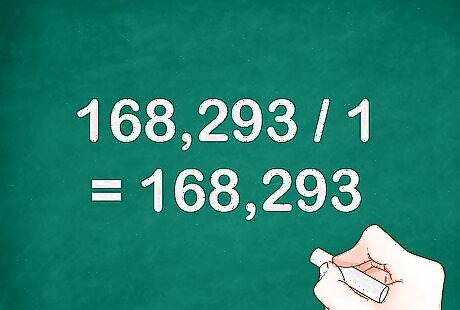
Divide any number by 1. Every number has 1 as a factor. This is because any number ( x {\displaystyle x} x), is equal to 1 × x {\displaystyle 1\times x} 1\times x. For example, 168,293 is divisible by 1, since 1 × 168 , 293 = 168 , 293 {\displaystyle 1\times 168,293=168,293} 1\times 168,293=168,293.
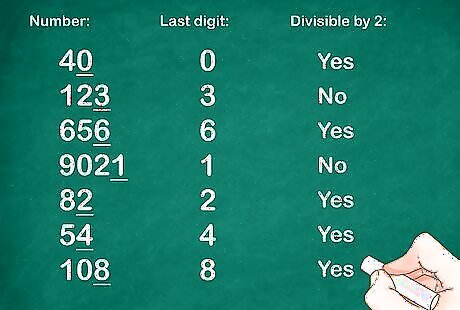
Divide even numbers by 2. By definition, an even number is one that is divisible by 2. So to check if any number, no matter how long, is divisible by 2, look at the last digit. If the last digit is even, the entire number is divisible by 2. Remember that 0 is an even number.
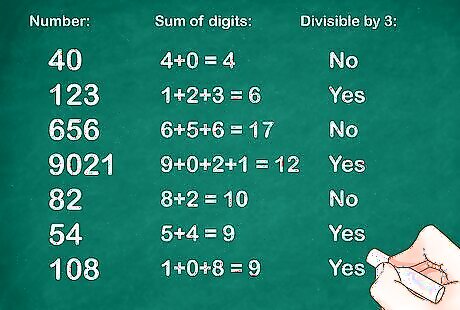
Check for divisibility by 3. To do this, add up all the digits in the number. If the sum of all digits is divisible by 3, the number is divisible by 3. You can repeat the addition of digits if the original sum is too long for you to gauge divisibility by 3. For example, the digits in 3,989,978,579,968,769,877 add up to 141. You can then add again: 1 + 4 + 1 = 6 {\displaystyle 1+4+1=6} 1+4+1=6. Since 6 is divisible by 3, you know the entire number is divisible by 3.
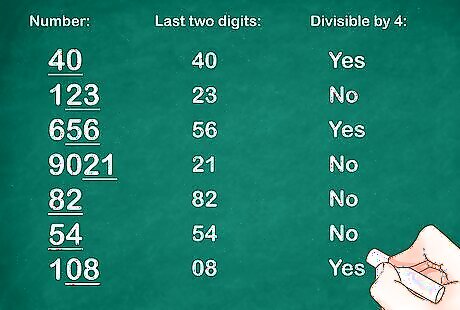
Check for divisibility by 4. Look at the last two digits in the number. Is the number made by the last two digits divisible by 4? If so, the entire number is divisible by 4. Note that only even numbers are divisible by 4. Multiples of 100 are always divisible by 4. Another way to check for divisibility by 4 is to divide the number by 2 twice. If the quotient is still a whole number, the original number is divisible by 4. For example, 876 2 = 438 {\displaystyle {\frac {876}{2}}=438} {\frac {876}{2}}=438, and then 438 2 = 219 {\displaystyle {\frac {438}{2}}=219} {\frac {438}{2}}=219. Since 219 is a whole number, you know that 876 is divisible by 4.
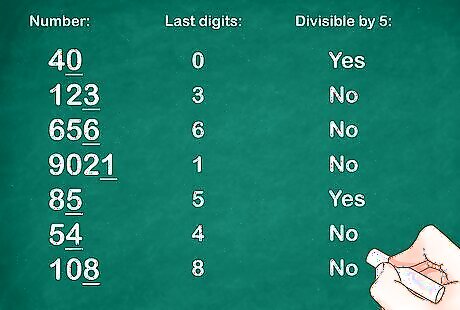
Check for divisibility of numbers for 5. Since any number ending in 0 or 5 is a multiple of 5, any number whose last digit is 0 or 5 is divisible by 5.
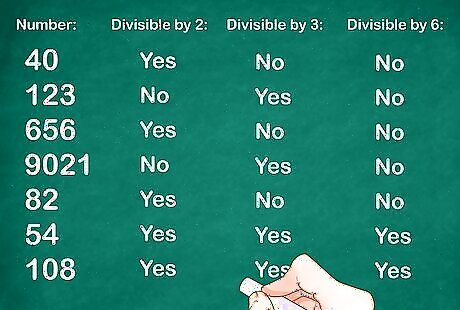
Check for divisibility by 6. If a number is even, and the sum of its digits are divisible by 3, then the number is divisible by 6. In other words, if a number is divisible by 2 and 3, it is divisible by 6.
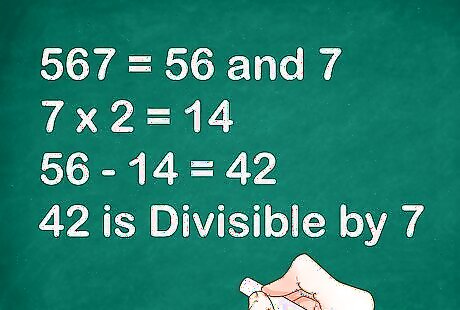
Check for divisibility by 7. Separate the last digit from the rest of the number. Double the last digit. Then, subtract that product from the number made by the remaining digits. If the difference is divisible by 7, then the whole number is divisible by 7. For example, to find out if 567 is divisible by 7, first separate the last digit from the number. This gives you 56 and 7. Double the last digit, 7: 7 × 2 = 14 {\displaystyle 7\times 2=14} 7\times 2=14. Then, subtract 14 from 56: 56 − 14 = 42 {\displaystyle 56-14=42} 56-14=42. Since 42 is divisible by 7, you know that 567 is divisible by 7.
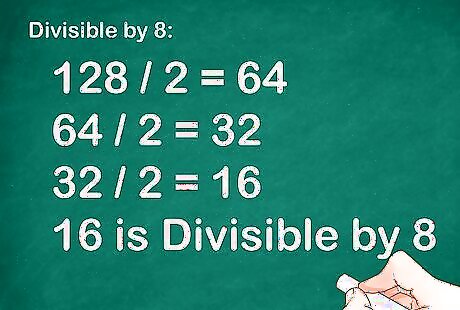
Check for divisibility by 8. Look at the last three digits in the number. If the number they make is divisible by 8, then the entire number is divisible by 8. Another way to do this is to halve the last three digits 3 times. If the final quotient is a whole number, then the entire number is divisible by 8. For example, 128 2 = 64 {\displaystyle {\frac {128}{2}}=64} {\frac {128}{2}}=64, then 64 2 = 32 {\displaystyle {\frac {64}{2}}=32} {\frac {64}{2}}=32, then 32 2 = 16 {\displaystyle {\frac {32}{2}}=16} {\frac {32}{2}}=16. Since 16 is a whole number, you know that the number 11,128 is divisible by 8.
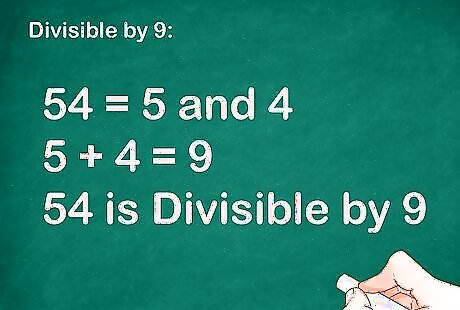
Check for divisibility by 9. A number is divisible by 9 if the sum of its digits is divisible by 9. If, after adding up the sum of all the component parts of a number which comes out to another two digit or bigger number the sum is exposed, take that number and add it's component parts. (Take for example 189: 1+8+9=27...if you then take 2+7 you will get 9. Therefore, 189 is evenly divisible by 9.) You can repeat the addition of digits if the original sum is too long for you to gauge divisibility by 9. For example, the digits in 3,989,978,579,968,769,877 add up to 141. You can then add again: 1 + 4 + 1 = 6 {\displaystyle 1+4+1=6} 1+4+1=6. Since 6 is not divisible by 9, you know the entire number is not divisible by 9.
Check for divisibility by 10. Divisibility by ten can happen when the last digit of that number ends in 0 - that's the only way.
Completing Sample Problems
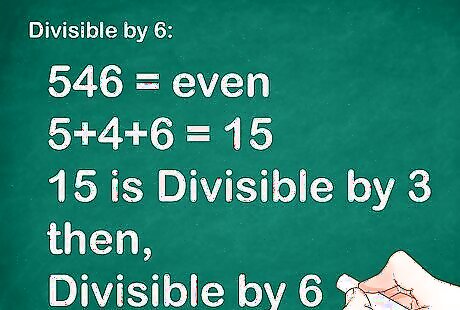
Determine whether the number 456 is divisible by 6. The test for determining whether a number is divisible by 6 is twofold. First determine whether the number is even. 456 is even, since it ends in 6. Then, determine whether the sum of the digits is divisible by 3. So, you would calculate 4 + 5 + 6 = 15 {\displaystyle 4+5+6=15} 4+5+6=15. The number 15 is divisible by 3. Since 456 passes both tests, it is divisible by 6.
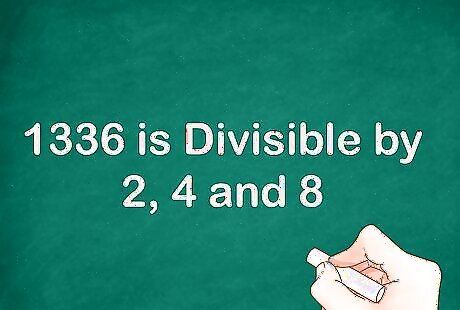
Consider the number 1,336. Which digits will evenly divide into this number? 1 divides evenly into the number, since any number is divisible by 1. 2 divides evenly into the number, since 1,336 is even. 3 does not divide evenly into the number, since the sum of its digits is 13, and 13 is not divisible by 3. 4 divides evenly into the number, since the last two digits, 36, is divisible by 4. 5 does not divide evenly into the number, since 1,336 does not end in 5 or 0. 6 does not divide evenly into the number. While it is an even number, the sum of its digits is not divisible by 3. 7 does not divide evenly into the number. When you double the last digit (6), and subtract it from the remaining digits, you get 133 − 12 = 121 {\displaystyle 133-12=121} 133-12=121. Since 121 is not divisible by 7, neither is 1,336. 8 divides evenly into the number, since the last three digits, 336, is divisible by 8. 9 does not divide evenly into the number, since the sum of its digits is 13, and 13 is not divisible by 9.
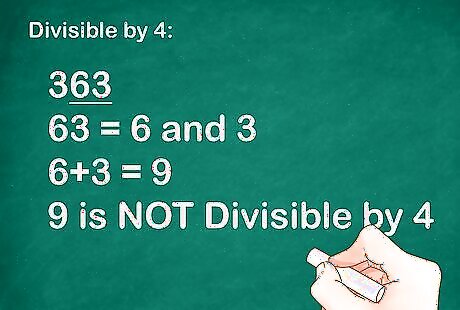
Solve the following problem. Brian is a kindergarten teacher. He has 363 crayons. He divides his class into four groups. Can he evenly divide the crayons among the four groups? He cannot evenly divide the crayons among the four groups. 363 is not divisible by 4, since it is not an even number, and since the number made from the last two digits, 63, is not divisible by 4.












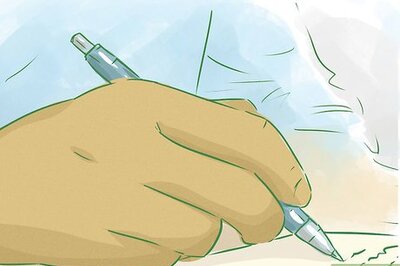

Comments
0 comment